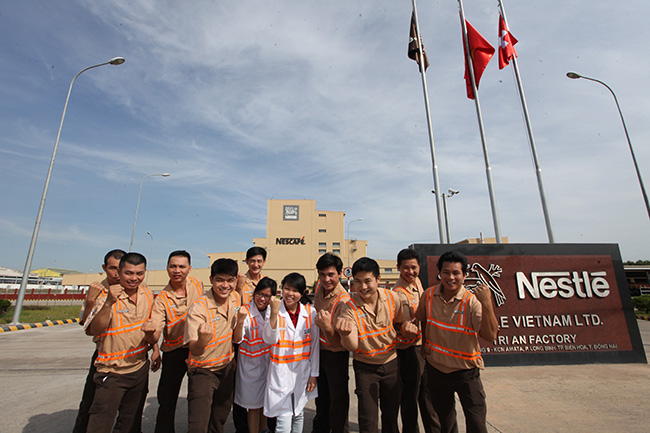Nestlé’s success story crowns 45 years of Swiss investment
 |
As Switzerland and Vietnam will celebrate 45 years of diplomatic relations this year, how would you evaluate their trading and investment relationship to date?
Switzerland and Vietnam established diplomatic relations on October 11, 1971. Over the last number of decades bilateral relations have continuously intensified, focusing on trade and investment, development co-operation, and tourism. Notably, trade flows in both directions have been increasing every year. In 2015, the trade volume between Switzerland and Vietnam amounted to CHF1.473 billion ($1.5 billion), with a trade deficit for Switzerland of CHF481 million ($498 million).
The three major categories of Swiss products exported to Vietnam are pharmaceuticals (around 40 per cent), machinery (around 30 per cent), and optical and medical instruments (7 per cent of the total export volume). Exports from Vietnam to Switzerland include electronic products and machines, textiles and footwear, seafood and organically produced agricultural products, coffee, rubber, pepper and ceramic amenities. These examples are proof of the diversified relations between the two countries, which the Swiss Embassy is determined to further develop and promote.
How many companies from Switzerland are operating in Vietnam currently?
Switzerland is one of the world’s most competitive and internationally integrated economies. It is the fourth-largest foreign investor from Europe in Vietnam with the accumulated investment capital of over $2 billion, and is providing employment for more than 15,000 people.
Swiss companies in Vietnam generate a wide range of products and services: industrial machinery; civil engineering, construction and architectural design, food and beverages, pharmaceuticals and chemicals; electronics and IT equipment, as well as shipping and trading services. Additionally, more and more highly specialised small- and medium-sized companies are now interested in choosing Vietnam as a production base, with the number of these investments doubling in recent years.
Many well-known Swiss companies have been investing in Vietnam for a long time – companies like Holcim, Nestlé, Schindler, ABB, and Syngenta have gained a renown here as dependable investors. There are approximately 100 Swiss companies operating in Vietnam under different entities: 100 per cent capital from Swiss firms, private joint ventures, and joint businesses between the state and private sector.
In addition, Vietnamese students have flocked to some of the well-known Swiss universities specialising in tourism and finance here.
 |
| Swiss investment in Vietnam has continued along a steady trajectory to hit an accumulated capital of $2 billion |
How important is the Vietnamese market to Swiss enterprises?
Vietnam is an important market for Switzerland because the Vietnamese economy is growing at an impressive speed. Its shift from a centrally-planned to a market economy has transformed the country from one of the poorest in the world into a lower middle-income one.
This track record is reflected in the economic relations between Switzerland and Vietnam. Vietnam has rapidly become an important destination for Swiss products and investments.
It is therefore not surprising that even more companies are looking for opportunities in Vietnam. With its improving business environment and increasing purchasing power, as well as the burgeoning industry here, Vietnam has the potential to become an even more important market for the Swiss economy.
Which sectors hold the most potential for Swiss investors in Vietnam?
We are growing very strongly in terms of food manufacturing technology, pharmaceutical and medicines, as well as in machinery and equipment. Since Vietnam wants to move up in the value chain in order to produce better machines and goods, it has been importing hi-tech machinery from Switzerland. Others sectors with a lot of potential for growth include bio-tech, green energy, and leaner and cleaner production lines.
Vietnam is aiming to reach its industrialisation goals by 2020. However, in order to reach them, good quality investment is crucial.
After 45 years of building our relationship, do you think there is still room to ramp up our investment? How can we improve upon our investment in Vietnam?
Yes, I think certainly there is room for development. In general, we are seeing a hugely improved business climate as a result of initiatives spearheaded by the Vietnamese government, but we have to ensure that the business environment is strong enough for the private sector. We know that the administrative procedures for businesses have been reduced and streamlined a lot over recent times, but it needs to be as efficient as possible.
I also think certain transaction charges should be reduced to ensure a safe and efficient business environment for all sectors. Other things which must be improved include the copyright and legal system. These will make your business environment more competitive, thus encouraging foreign investors to establish a presence here or to expand their existing investment projects.
Among the Swiss companies investing in Vietnam, Nestlé stands out as a success story to be emulated. What is your assessment of Nestlé’s activities in Vietnam?
Nestlé is one of the first Swiss companies to enter Vietnam. It is now the biggest investor from Switzerland to Vietnam with the investment capital of more than $520 million. Nestlé is a good example of a company that offers products tailored to local tastes by taking into account the local environment.
The company has been here for many years, and its investment has been growing all the time through new factories, using more local labour, and more products intended for both the local and international markets.
I have recently had the opportunity to take part in the ground breaking ceremony for a new Milo factory in the north. For me, this activity demonstrated the company’s enlarged investment strategy in Vietnam.
This is a prime example of how a big company can invest successfully in Vietnam. We are very proud of it because Nestlé epitomises the Swiss business values of quality and trustworthiness, ability, high quality products, and appeal for a wide range of consumers.
Nestlé’s factories in Vietnam are the most modern in the world with advanced production lines, fully automated systems, sterilised production lines, and state-of-the-art facilities. Another impressive quality is that Nestlé combines all the factors that make a responsible and successful company: safety, quality, and diversified products. They also invest heavily in improving the skills of their workers, as they are keenly aware that the most important access point to advanced technology is through people.
Another thing I also appreciated is the enthusiasm shown from the people working in Nestlé’s factories. It is like a big family where all people understand each other and are devoted to the ideal of responsibility within the company.
|
Axon started its offshore software development business about eight years ago. At that time we had a team with just 10 developers - in the meantime with have two branches, one in Ho Chi Minh City and the other one in Danang, with more than 300 engineers. Despite the strong growth, we were able to maintain our culture and values, such as Reliability, Transparency, Honesty and Passion. This is an achievement that is not self evident at all and this makes us proud. I think this is strongly depending on in what industry you do business in Vietnam. The IT industry can certainly profit from the healthy population structure, the huge amount of students graduating from faculties of natural science and from a general ‘changes are welcome’ mentality of Vietnamese people. I also have the feeling, that the hunger for success and the power of innovation is matchless greater than in the surrounding countries. On the other hand we’re suffering from a degree of legal uncertainty and arbitrariness of some authorities. As we have had very good experience with the decentralisation of our operational units, we’re thinking of opening a new development centre in another province of Vietnam for further growth. This usually gives us more flexibility on the labour market as well as the opportunity to have for each division its very own local culture. From what I can see is, that the current business related regulations - especially the labour law - are aimed for manufactory industries. In an industry in which the demand for highly skilled labour forces is larger than the supply, this leads to an unhealthy balance of power. Therefore I propose to implement a labour law with more flexibility and to reduce the power of trade unions for staff with high income. |
What the stars mean:
★ Poor ★ ★ Promising ★★★ Good ★★★★ Very good ★★★★★ Exceptional
Latest News
More News
- VAL inaugurates second production line to meet domestic animal feed demand (December 19, 2025 | 16:37)
- Sun Group pioneers urban tram system in Phu Quoc (December 19, 2025 | 15:00)
- Top 10 notable events of Vietnam’s industry and trade sector in 2025 (December 19, 2025 | 14:00)
- Seven major projects launched to drive Hanoi’s next growth phase (December 19, 2025 | 14:00)
- Rare, beautiful, sustainable: the mark of iconic real estate (December 19, 2025 | 08:00)
- Mondelez Kinh Do - a chapter of purpose-led leadership in Vietnam (December 18, 2025 | 09:44)
- VNPAY services receive the highest-level PCI DSS international security certificates for six consecutive years (December 17, 2025 | 23:47)
- F&N deepens investment in Vinamilk (December 17, 2025 | 09:00)
- Long-term capital seen as key hurdle to green growth (December 16, 2025 | 08:00)
- HDS Summit spotlights Vietnam’s rising role in regional supply chains (December 16, 2025 | 08:00)

 Markus Baur - CEO of AXON ACTIVE VIETNAM Co. Ltd.
Markus Baur - CEO of AXON ACTIVE VIETNAM Co. Ltd.
















 Mobile Version
Mobile Version